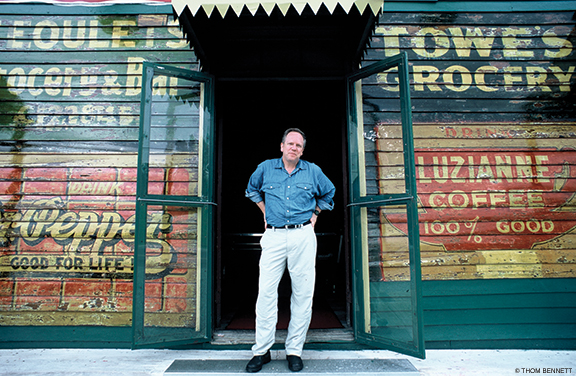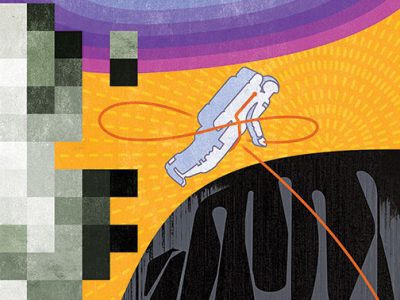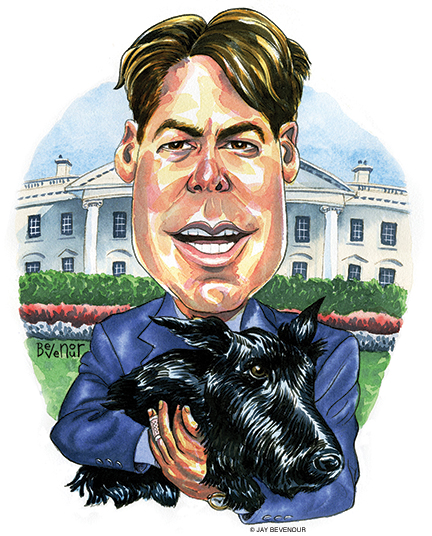
Over Memorial Day weekend, word spread across Philadelphia-area social media that WHYY-FM, the city’s largest public-radio station, was dropping American Routes, the popular, dazzlingly eclectic music-and-interview program produced and hosted by Nick Spitzer C’72. [“Digging Routes,” Mar|Apr 2009.] The station’s terse online announcement was more or less buried under its discussion of the shows replacing it, such as America’s Test Kitchen Radio and Freakonomics.
Despite the short (one-week) notice, the move wasn’t entirely surprising. WHYY has always been a predominately news-and-information station, and like many such stations has been streamlining its programming. Routes, for all its interviews and casually erudite commentary, is still music-driven. But even though the two-hour weekly program is carried by 305 stations around the country and has more than a million listeners, the decision still came as a shock, both to Spitzer and to his large local following. Routes may be broadcast out of New Orleans (where Spitzer lives and is professor of folklore at Tulane University), and it has a decidedly Southern sensibility, but Philadelphia was its biggest market—and, in a very real sense, its spiritual birthplace.
Then, a couple of weeks later, another announcement came from across town: WXPN, Penn’s public-radio station, had snapped it up. And on the following Sunday, those who had their dials set to 88.5 from 3-5 p.m. could hear Routes in all its sonic glory. (It can be heard online anytime at americanroutes.org, but fact is, it’s still a radio show.)
For its host, it was not only the best possible outcome but a very happy homecoming. And not just because of the size and importance of the Philadelphia market.
“No WXPN and no Penn folklore—no American Routes,” says Spitzer, riffing off Art Blakey’s pithy aphorism, “No America, no jazz.” Having jumpstarted his radio career at the station in 1969 when he was a “gawky freshman,” he points out that he’s “still doing folklore and anthropology and radio”—only now as a “graying elder.”
“For me personally, Philly is the big one—my alma mater, the city, the University,” he adds. “So this is a thrilling homecoming.”
The bon temps rolled in both directions.
“American Routes is a terrific program,” says Roger LaMay, the station’s general manager, “and it certainly needs to be on the air in Philadelphia—and frankly, it really belongs on XPN. It really made perfect sense for us.”
When he and WXPN program director Bruce Warren first discussed the possibility, “We basically said, ‘If we’re going to do this, let’s do it as quickly as we can,’” LaMay adds. “The fact that Nick’s a Penn guy is all the better, and he has an XPN history, so we were just like, ‘All right—let’s do it.’”
The station will “look for ways to connect American Routes and World Café”—its highly regarded syndicated program hosted by Spitzer’s old friend and WMMR colleague David Dye, LaMay notes. “A lot of stations that carry World Café also carry American Routes, so we think it’s going to be a really great fit. We’re very hopeful that people who listen to American Routes on HYY will come over with him.”
The upbeat tone on both sides is noteworthy for several reasons, one being that Spitzer, along with some other WXPN alumni of his era, had occasionally criticized the station for not providing students with the same broadcasting and managerial opportunities his cohort had known, as well as for certain aspects of its programming. While the criticism ruffled some feathers at the time, LaMay calls it “ancient history,” and Spitzer agrees.
“When the reconciliation happened, everyone was ready to do it,” he says. “We all knew that this made sense. Nobody was sitting around going, ‘Goddamn it.’” He cites some counsel he received from Al Filreis—the Kelly Professor of English, faculty director of the Kelly Writers House, and a former member of the WXPN board—as having helped bring him around.
“Al said that times change, and media licenses are important things to universities, and these days, a place like Kelly Writers House is where students go to do deeper personal-vision creative work with art and culture—in this case, the written and spoken word,” Spitzer recalls—and that just as with new forms of poetry, the new music will sometimes have a wide range of quality. “I stepped back, took a breath, and said, ‘He’s right.’
“I believe that the evolution to what XPN has become is a really good thing,” he adds. As its musical diversity has matured, the station has “emerged as a really significant force in national radio for music and contemporary culture. We need music stations because of this enormous push in major markets to unify a format around news talk and these sort of tertiary, comedy-quiz, cooking, gardening shows.”
As its reputation for innovation and energy has grown, WXPN’s listener membership has climbed steadily, and now tops 30,000. In addition to large-scale special events (like the three-day NON-COMMvention and XPoNential Music Festival) and Free at Noon concerts at World Café Live (the Walnut Street venue that also houses the station’s studios), WXPN has recently sponsored two year-long program series. The first was Zydeco Crossroads [“Arts,” Jan|Feb 2016], which featured live bands, dance lessons, a CD, and a documentary film. Spitzer, who did his doctoral dissertation on zydeco and Afro-French Louisiana culture at the University of Texas, helped out from New Orleans—another sign that he was already back on board. The second was Latin Roots Live, a series of Latin-themed concerts, film screenings, and other events.
After a dozen years of airing Routes on WHYY and tweaking it to accommodate that station’s news-and-information format, Spitzer suggests that moving to WXPN will allow for “freshening” the show and emphasizing the music even more.
“I think by and large it’s going to encourage me to do a little less documentary-for-documentary’s sake, and be maybe a little more attentive to the entertainment value,” he says. “I think freshening American Routes is a matter of simply accepting the comfort of enjoying the music for what it is, and maybe worrying a little less about how do we keep up with a world gone to news. It’s a subtle shift. And I think XPN is a good model for it, and there are a lot of stations trying to emulate it, and if we can do it well with XPN I think we can do it well with some of those stations that don’t currently carry Routes.”
The station’s decision to pick up the show “made me feel great,” he says. “You know, this is what we do radio for—for people that care about music. This is a moment of goodness in an increasingly ugly corporate system that we’re trying to stay alive in with music and culture.” —S.H.




